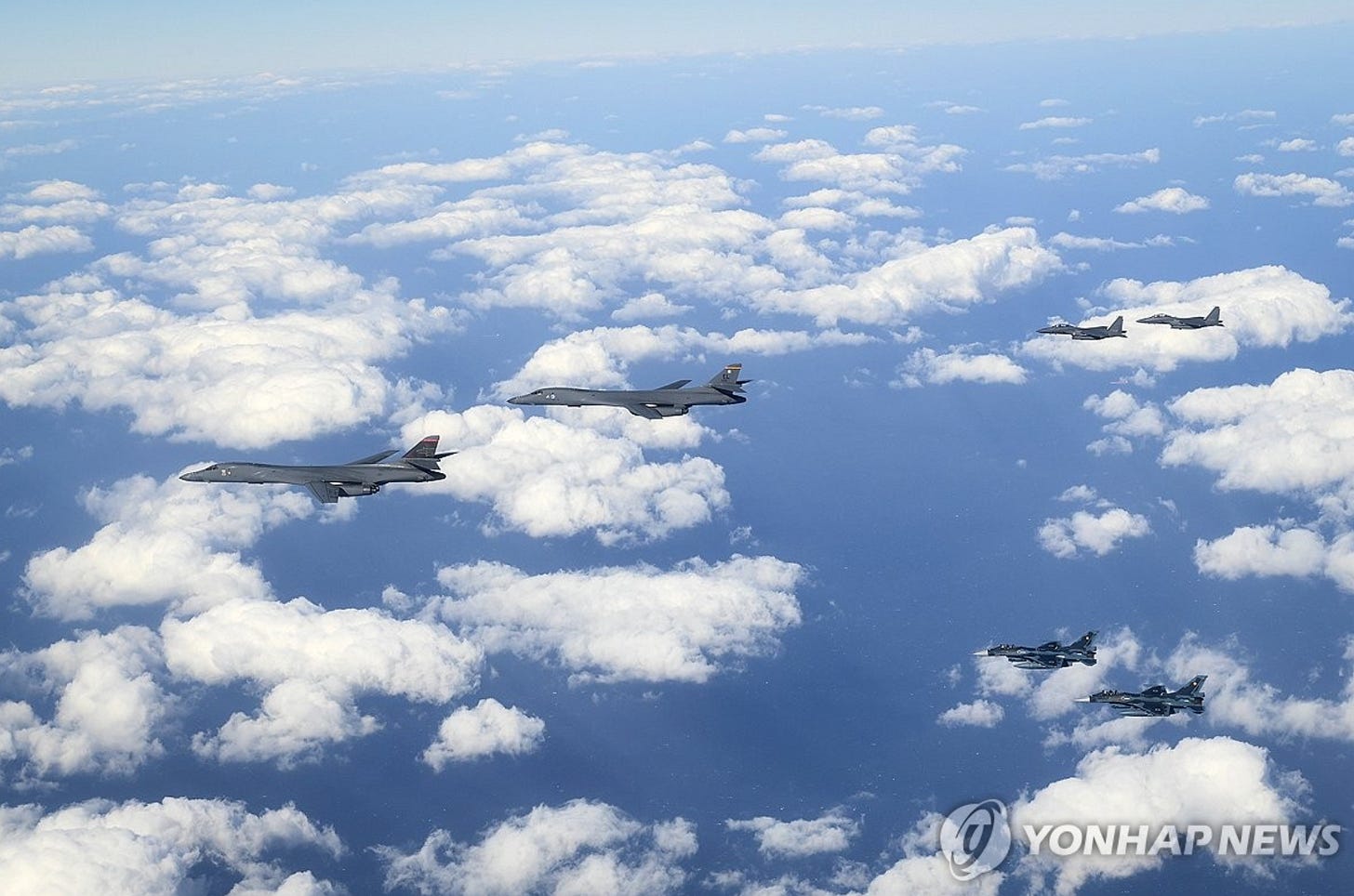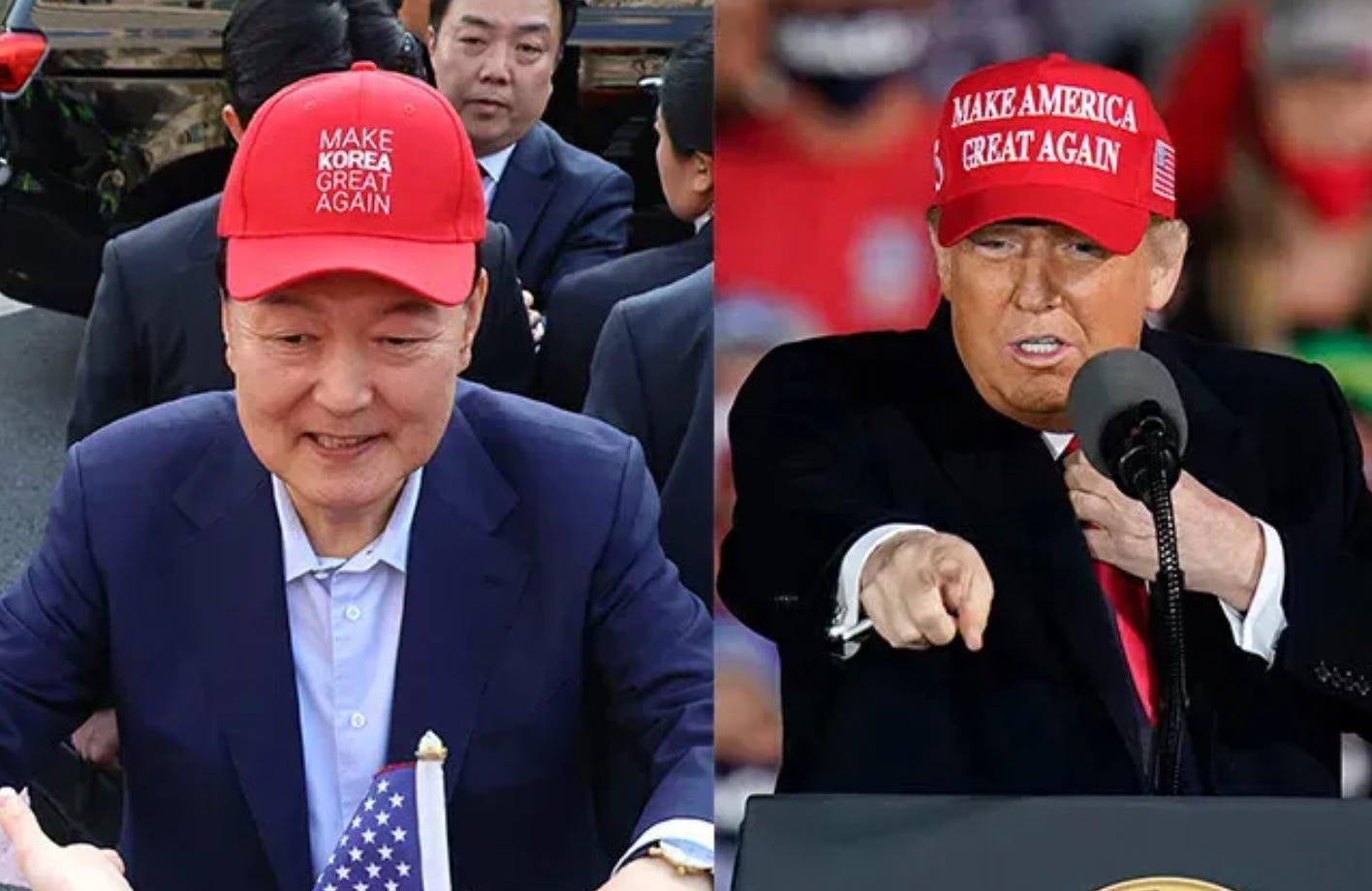Pacific Rim Report: South Korea at the Crossroads
South Korea's new president takes command as Trump's White House says he is "open" to talks with the DPRK. Meanwhile, a former student activist will be PM.
As promised in my "About" page, I will be producing a weekly report on the latest events in South Korea, Japan, Okinawa, and the Asia-Pacific, with a special emphasis on US militarism and policies in the region. My series will be based primarily on sources in Korea and Japan because, in my view, the US mainstream media cannot be trusted on either country. If you as a subscriber have comments or questions, please drop them in the comments section at the end or send a direct message to me. Note: I use the official titles DPRK for North Korea and ROK for the South throughout this newsletter. Welcome again to EMPIRE BLUES.
President Lee Jae-myung offers an olive branch to North Korea as he takes power in Seoul

WASHINGTON - Two weeks after taking power on June 4th after a smashing electoral victory over his right-wing rival, South Korean President Lee Jae-Myung has moved on several fronts to break decisively with Yoon Suk Yeol and his corrupt and inept administration.
He started out with a bang, assuring Koreans and the United States that he will immediately seek to defuse military tensions with the DPRK and its leader, Kim Jong Un - a key campaign promise. “We will work on quickly restoring severed channels of inter-Korean communication and rebuilding the crisis management system,” Lee posted on social media on June 15th, the 25th anniversary of the "North-South Joint Declaration."
That famous declaration was signed by former ROK president Kim Dae Jung and DPRK leader Kim Jong Il (the father of Kim Jong Un) during their historic inter-Korean summit in 2000. “History has taught us that when peace is compromised, our economy and national security are threatened, as well as people’s everyday lives," said Lee. "We need to transform the ‘Korean risk’ into a ‘Korean premium’ and together create a future in which South and North Korea can thrive together."
In another move demanded by the millions of voters who took to the streets this year to demand Yoon's impeachment, Lee designated three independent counsels to investigate Yoon's short-lived military coup in December, serious corruption allegations involving his controversial wife Kim Keon Hee, and the Yoon government's botched investigation into the tragic death of a Korean Marine in 2023 (the National Assembly demanded the probes in a lop-sided 194-3 vote on June 5th)
To show his determination to make the peace with the North, Lee's first directive was to order the termination of the cross-border propaganda broadcasts into the DPRK by the South Korean military that have disrupted the daily lives of people living along the DMZ.
"South Korea’s new leftwing president, Lee Jae-myung, has taken early steps to dial down the acrimony, ordering his country’s military to cease the broadcasts in a possible early signal of his administration’s more conciliatory stance towards its northern adversary," the Financial Times reported, with little evidence to support its "leftwing" political label.
Lee's spokesperson Kang Yoo-jung said the move to halt the broadcasts was "intended to de-escalate the military stand-off between the two Koreas." "President Lee made this decision as a pre-emptive step to ease tensions, given the absence of any recent major provocations by North Korea," she said, adding that his new government was committed to “restoring trust in inter-Korean relations and establishing peace on the Korean Peninsula.”
The day after Lee's order, the North Korean military ended it own broadcasts. Even the Chosun Ilbo had to admit Lee's strategy had worked.
"North Korea has gone quiet along its southern border...marking a possible de-escalation in a year-long psychological standoff between the two Koreas," the conservative newspaper reported. It cited a statement from South Korea's Joint Chief of Staff that “there were no North Korean loudspeaker broadcasts detected today,” adding that the incident is "fueling speculation that Pyongyang may have responded in kind after Seoul pulled the plug on its own campaign."
Lee embraces ROK-Japan-US trilateral relations, with caveats
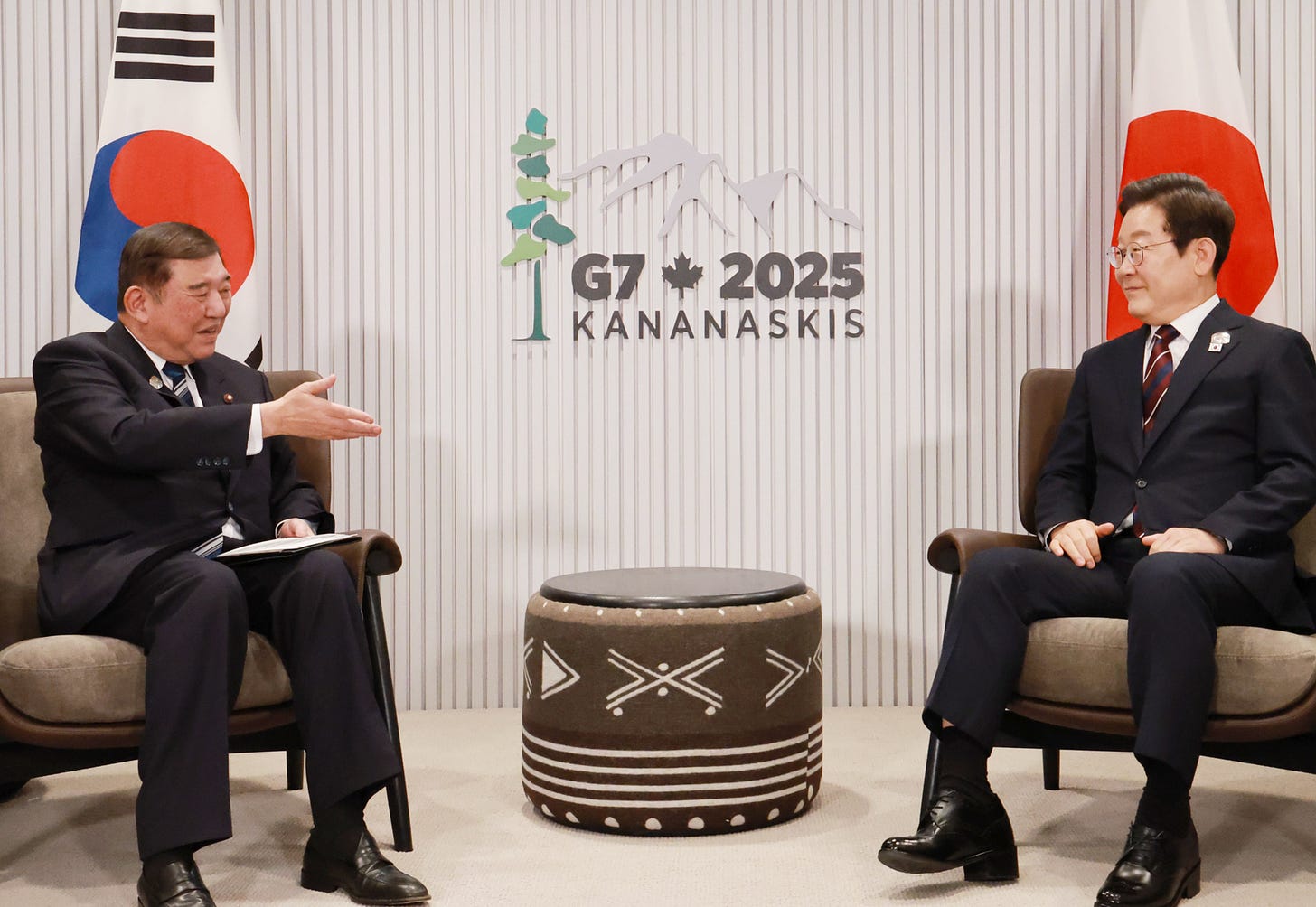
Even as Lee made that symbolic gesture to North Korea, he laid out his pragmatic approach to foreign policy that will continue to embrace the United States and Japan as the ROK's key allies.
In his inaugural address on June 4th, he described that approach as a “practical diplomacy centered on national interest.” He vowed to strengthen the ROK-US bilateral military alliance as well as the trilateral cooperation with Japan initiated by his predecessor and former US president Joe Biden in 2023. As for the rest of Asia, he said he would approach relations with neighboring countries “from the perspective of the national interest and pragmatism."
Lee chose Wi Sung-lac, a retired diplomat who served as a key negotiator and trouble-shooter on North Korea for liberal and conservative administrations, as his national security adviser. Former unification minister Lee Jong-seok, a North Korea expert "who strongly advocated the Sunshine Policy adopted by Kim Dae Jung that focused on engagement and humanitarian assistance," was named director of the National Intelligence Service. And on June 16th, Lee celebrated the 60th anniversary of South Korea's normalization treaty with Japan that originally set the stage for Seoul's three-way military ties with Tokyo and Washington.
A day earlier, as if to underscore Lee's fealty to the US-Japan-ROK partnership, the three countries held their first joint military air exercises since Lee took office. Photos from the US 7th Air Force provided to the government-owned Yonhap News showed two U.S. B1-B "Lancer" bombers made by Boeing from Guam being escorted by two Korean Boeing F-15K "Slam Eagle" and two Japanese Mitsubishi F-2 fighter jets "during combined drills over waters near the Korean Peninsula." "The [ROK] Air Force said it plans to continue to conduct such trilateral drills on the back of a firm South Korea-U.S. alliance," Yonhap reported.
Still, Lee made it clear that the trilateral military partnership won't define South Korea's role in the world. In his initial phone call to Japanese Prime Minister Shigeru Ishiba, his first as president, Lee emphasized that he would not follow Yoon's groveling, sycophantic approach to Japan that had angered many Koreans and was "savagely criticized" by Lee and his Democratic Party of Korea in the months leading up to his election.
In that call, according to Lee's presidential office, the two leaders agreed to "build a more solid and mature relationship between Korea and Japan based on mutual respect, trust, and a responsible attitude." They also pledged to “work together to address various geopolitical challenges within the framework of trilateral cooperation among Korea, the US, and Japan.”
Japan's Ministry of Foreign Affairs likewise said that “the two leaders shared views on the importance of Korea-Japan relations and trilateral cooperation and confirmed their intention to steadily advance the bilateral relationship.” Lee and Ishiba repeated their vows at a bilateral session at the G7 meeting in Canada, where both had gone to meet Trump (only Ishiba was granted the privilege - a 30-minute session just before the president flew back to Washington to manage his new war with Iran).
The term "more solid and mature" in Lee's statements was a direct rebuke of Yoon. In order to join the trilateral alliance with the US and Japan, the pro-Japanese president had agreed to "settle" grievances over Japanese war crimes during World War II by agreeing that South Korea, and not its former colonizer and its corporations, would pay reparations to the "comfort women" and slave laborers forced to work for the Japanese Empire. This was widely seen as a sellout, with some Koreans even branding Yoon a national traitor for his actions. The center-left Kyunghyang Shinmun accurately described what's at stake.
A truly "mature" Korea-Japan relationship requires not only mutual trust but also concrete action. In that sense, thorny issues like historical disputes and territorial claims, such as over Dokdo, cannot be overlooked. During his presidential campaign, Lee had emphasized the need to separate historical issues from exchanges in economics, society, and culture, while also saying that “resolving historical issues is essential for building a future-oriented relationship.” Ishiba may wish to maintain the status quo of improved relations achieved through unilateral concessions by the previous Yoon administration, but he must also acknowledge that the Korean public cannot accept Japan’s regressive views on history.
With Yoon gone, South Korea faces tremendous pressure from the Trump administration to align with US strategy in the Pacific. Korean policymakers now "worry that America's fixation on the rise of China will lead it to neglect deterrence efforts against Pyongyang, while also pressuring South Korea into a more confrontational stance towards Beijing," the FT's Christian Davies wrote from Seoul in an article entitled "The 'quiet' crisis brewing between the US and South Korea."
That phrase is straight from the lips of Victor Cha, the front-runner of Washington's growing corps of Korea "experts" who constantly jockey for media attention to press their views on America's junior ally in Asia. But there's some truth to it.
South Korean lawmakers from both the liberal and conservative parties are concerned that Trump, whose White House has said he is "receptive" to another round of talks with Kim Jong Un, could freeze the ROK out of any negotiations with the DPRK (much like he did with Ukraine) and make decisions on the US military presence in the South without consulting the ROK government. They have good reason to worry: throughout the peace process during his first term, Trump and John Bolton, his national security adviser, treated South Korea, its president Moon Jae In, and the ROK's own national interests with utter contempt.
South Korea's dilemma was summarized in a recent column in the center-right JoongAng Daily by Yun Byung-se, the former prime minister to former president Park Guen Hye, whose impeachment in 2017 led directly to Moon's election that year. "The Trump administration now identifies China as the sole pacing threat, relegating North Korea’s nuclear ambitions to a lower priority," wrote Yun, who is now co-chair of the Netherlands-based AI watchdog group GC REAIM.
"As U.S. Secretary of Defense Pete Hegseth emphasized during his address at the Shangri-La Dialogue last month, Washington has made its strategic pivot toward countering China official. The United States is recalibrating the expectations it has of allies, asking them to bear greater burdens, including risk exposure. Japan, Australia and the Philippines have signaled support for this new direction, often referred to as the 'Squad.' Korea is now under increasing pressure to align with this vision."
The Trump administration's demand on South Korea for more "burden sharing" has also disturbed the DPRK.
This week, the Korea Central News Agency in Pyongyang ran an article denouncing the Trump/Hegseth push on South Korea as "extremely provocative," accusing the U.S. of harboring a "strategic intention to maintain its hegemonic position in the Asia-Pacific region."
It is a deep-rooted doctrine of aggression of the U.S. which has thought out under the pretext of promptly coping with the 'uncertain security threat' in any region on the earth since the end of the Cold War and evolved into a vicious one under the pretext of flexibility," the KCNA claimed. It also argued that the push for "strategic flexibility" would "ignite various elements of conflicts latent in Northeast Asia and bring about a huge chain explosion." The commentary warned that South Korea would serve as the primary forward base and that its armed forces would be drawn into war under the "subordinated structure" of its alliance with the U.S. if US Forces Korea (USFK) advances into major regions under an expanded role."
Navigating Trump's future vision for South Korea's military alliance with the United States while attempting to restart talks with North Korea will be a tough job for President Lee. To protect his country's sovereignty, the ROK's new president will have to walk a fine line between solid cooperation and subtle disagreement with both Japan and the United States. But in my view, the chances of a major break between South Korea and the United States on issues of national security seem slim in the near term.
At the same time, the expectations held by US-based Korea analysts, foreign reporters, and even US peace activists of Lee as a left-wing leader who will make fundamental changes to the US-ROK military alliance are misplaced. "While global headlines warned of a leftist takeover of the South Korean presidency, there is in fact nothing left-wing about Lee’s political platform,” the Korean journalist Kap Seol wrote in an excellent profile of Lee in the Marxist publication Jacobin.
[These writers] tend to confuse Lee’s humble beginnings with his politics or mistake his brief dabbling as a governor with a universal income scheme - a measure that after all has plenty of support in capitalist circles, especially among libertarian tech tycoons - for socialist experimentation. When asked last year by the Wall Street Journal about critics comparing him to Bernie Sanders, Lee quipped, "Some have even said I’m like the ‘Trump of Korea.’”
Lee's choice for Prime Minister was jailed in 1985 for protesting the US role in Gwangju
One of Lee's most interesting cabinet picks was the former activist and four-term DPK lawmaker Kim Min-Seok, who will serve as South Korea's Prime Minister once approved by the National Assembly.
Kim, who was considered Lee's "strategist in chief" inside his party, will bring a healthy skepticism of the US military to Lee's government as one of 73 university students arrested in 1985 for occupying the US Cultural Center in downtown Seoul to protest the US role in suppressing the 1980 Gwangju Uprising. He was briefly banned from entering the United States in retaliation.
In the famous incident on May 25, 1985, the students seized the US Information Service library near the highly secure US Embassy building and "demanded that the United States apologize for its role in approving use of South Korean troops to suppress the insurrection in the provincial capital city," the well-informed Sam Jameson of the Los Angeles Times reported at the time. "They also distributed copies of an appeal demanding that [General Chun Doo Hwan] be held responsible for the deaths of at least 189 Koreans in a 10-day insurrection in Kwangju that followed Chun’s May 17, 1980, seizure of power." The total number of deaths In Gwangju was later revised by the city to around 400.
The incident shocked US diplomats in South Korea, who denied any US involvement even after I obtained thousands of documents showing that the Carter administration had given Chun a green light to deploy his military against the huge students protests that engulfed South Korea in the days before the Gwangju massacre. Some of the embassy officials involved wrote a detailed account of the USIS incident for a diplomatic magazine in 2017. It repeated previous US lies and misrepresentations about Gwangju but lauded themselves for their "crisis management."
Though the United States had no involvement in the Kwangju incident and was distancing itself from the repressive Chun regime, lingering resentment toward the U.S. and misunderstandings about Kwangju persisted through the end of the twentieth century. After three long, tense days, the students, having shared their concerns with the Americans and with the larger South Korean public, peacefully left the library. The resolution of the occupation of the U.S. Embassy’s library was seen as a case study in successful crisis management.
The USIS incident was one of many anti-American actions that caught the attention of the Central Intelligence Agency, which carefully monitored the South Korean student movement throughout the 1980s. An intelligence assessment written in June 1985 and declassified in 2011 is, in retrospect, quite accurate; yet strangely, much of the report remains classified, as these photos of the documents show. The secret report from the CIA’s Directorate of Intelligence stated this:
The increase in anti-US incidents this spring, culminating in the student occupation in May of the United States Information Service (USIS) Library in Seoul, was timed by protesters to coincide with President Chun's April visit to Washington and the fifth anniversary of the Army's suppression of the Kwangju uprising. The pattern of protest is similar to the anti-Japanese events that coincided with Chun's visit to Tokyo last year.
To a large extent the recent attacks on the United States have had Chun as their ultimate target, playing on nationalistic sentiments to find one more issue with which to mobilize protests against the President. The protesters sense that Chun's domestic position is weaker as a result of the parliamentary elections in February and the return to center stage of several outspoken political opponents.
In our view, several related trends in South Korean publications, popular opinion, and elite attitudes, however, suggest that opposition to Chun is not the sole motivation behind the rise in anti-US sentiment. Although the majority of Koreans remain well-disposed toward the United States, we believe that anti-US incidents also reflect a reappraisal of the US relationship that has become increasingly apparent in recent months.
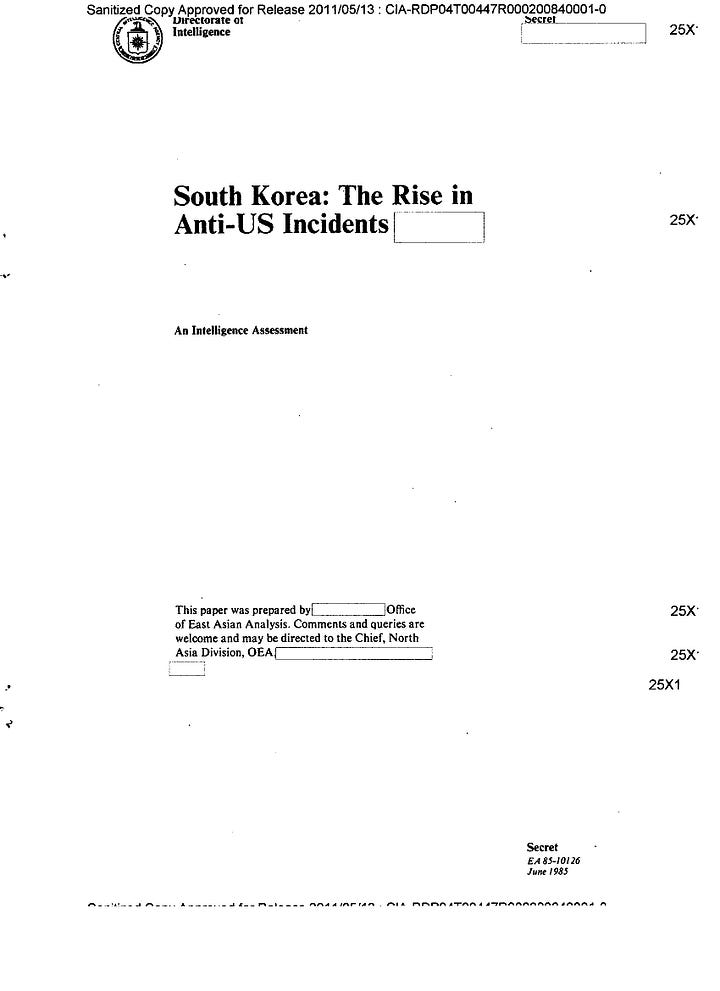
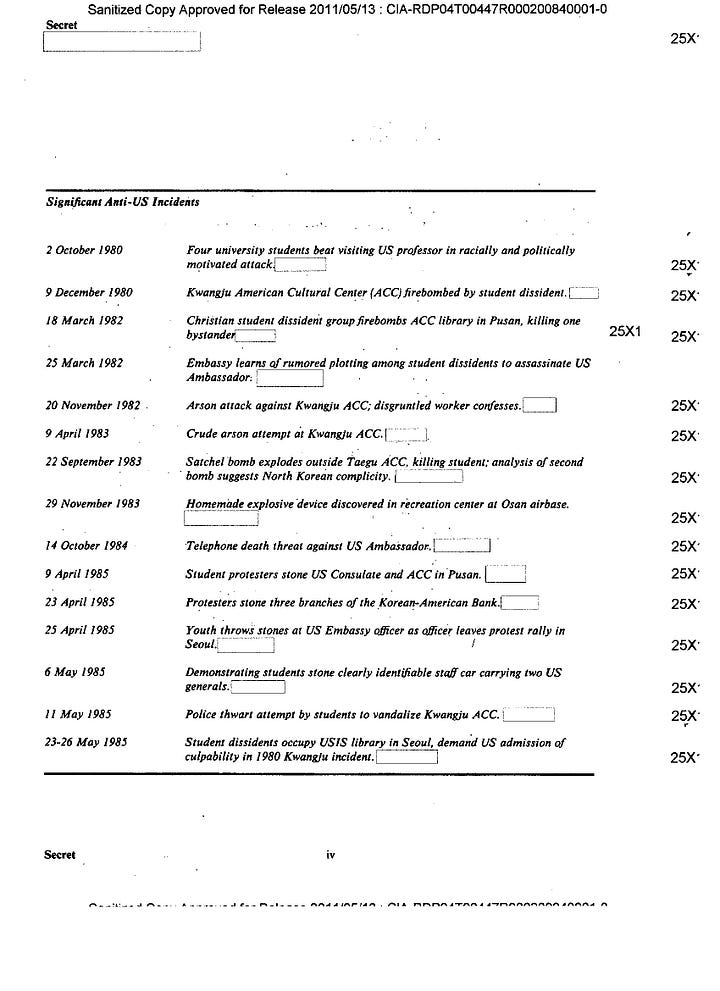
Conservatives in the United States and South Korea are already attacking Rep. Kim as an "anti-American" figure who could taint US-ROK relations. "Early moves by South Korea’s new president suggest a sharp ideological turn, reshaping ties with allies and raising questions about strategic priorities," one critic wrote in Asia Times. Kim's appointment "is widely seen as a clear signal that Lee’s administration is willing to deprioritize relations with the US in favor of a foreign policy more aligned with leftist views." The right-wing People Power Party, now in opposition, has demanded that Lee withdraw the nomination and is investigating Kim on "moral controversies" that include "illegal political funds, financial transactions, and asset accumulation."
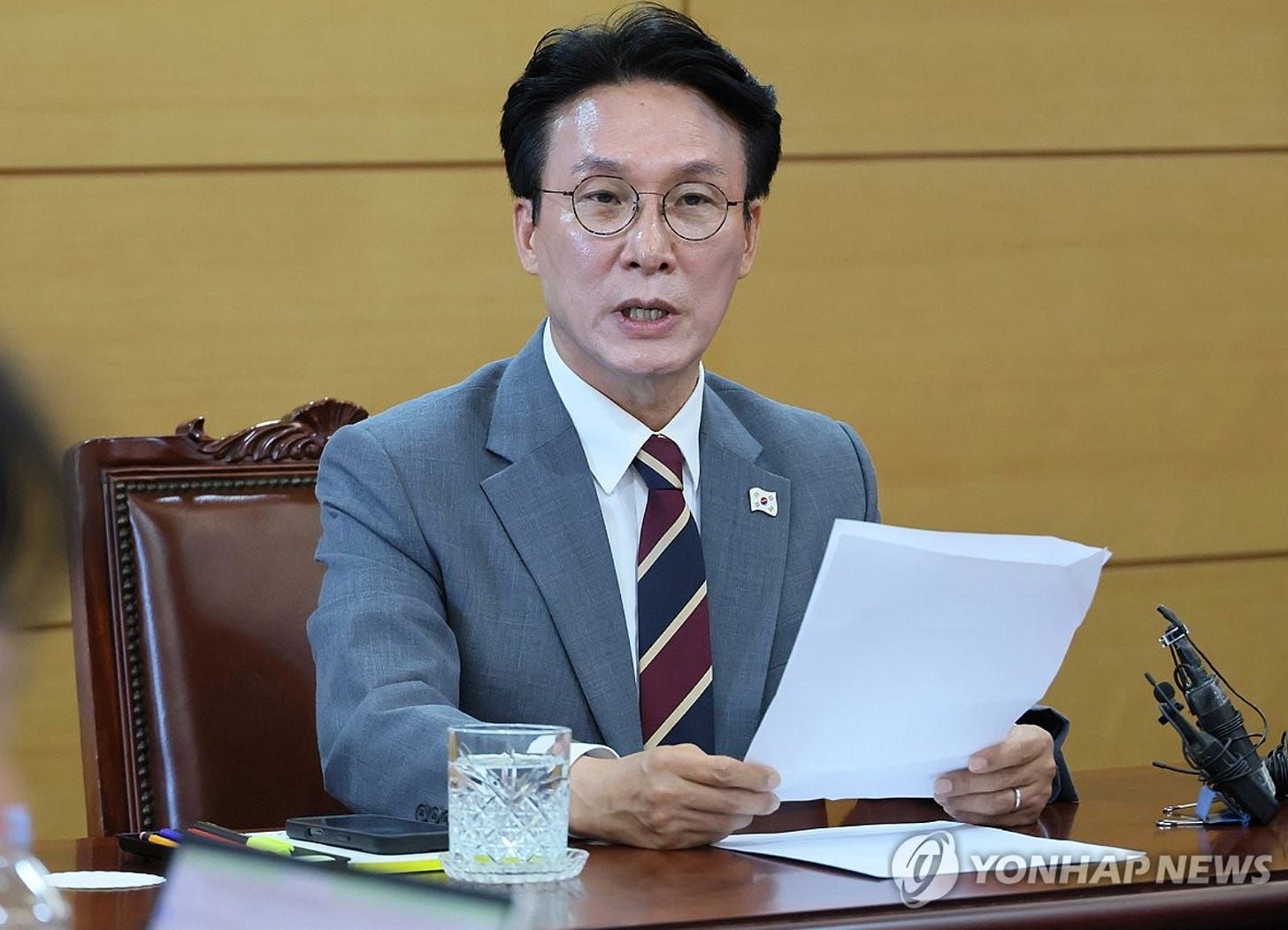
Kim, for his part, denounced the allegations and strongly defended the 1985 action as a "very important incident" that helped shape the US government's response to Yoon's attempted coup last December. In an interview with reporters on June 10th, he claimed that the US government consistently expressed support for South Korea's people and democratic systems while opposing the "military insurrection forces."
In that interview, Kim also said that his earlier activism, and the US response, had helped shape his now-positive views of the United States. And he dismissed "rumors" that he is anti-American. "I have a relatively deep understanding of the United States and have had personal relationships with key members of the Trump administration for quite a long time" as a senior lawmaker, Kim said, pointing out that he had studied at Harvard University and was qualified as a licensed U.S. attorney. "I think that my serving as prime minister of the South Korean government will in many respects contribute in certain ways to working out South Korea-U.S. relations."
Kim's claims about the US response to Yoon's coup may be an exaggeration; as far as I know, neither the Biden administration nor Trump publicly condemned Yoon for his anti-democratic actions on December 3rd. But Kim's knowledge of past coups, particularly Chun's takeover in 1980, gave him an unusual perspective on the dangers presented by Yoon, according to a profile in the Korea Herald. As early as August 2024, the newspaper said, Kim was "raising alarms" about the possibility of a coup attempt by Yoon. But he was "met with skepticism," even within his own party.
So when Yoon declared martial law on the night of December 3rd, "Kim's early warnings received renewed attention, and he played a "quintessential role" in orchestrating the DPK's response to Yoon's decree. "He warned about it when no one saw it coming. It's because of him that we were able to respond so promptly," one of his lawmaker colleagues, speaking anonymously, told the reporter. Kim's nomination hearings take place next week.
Lee, like Moon, cracks down on defector actions at the DMZ
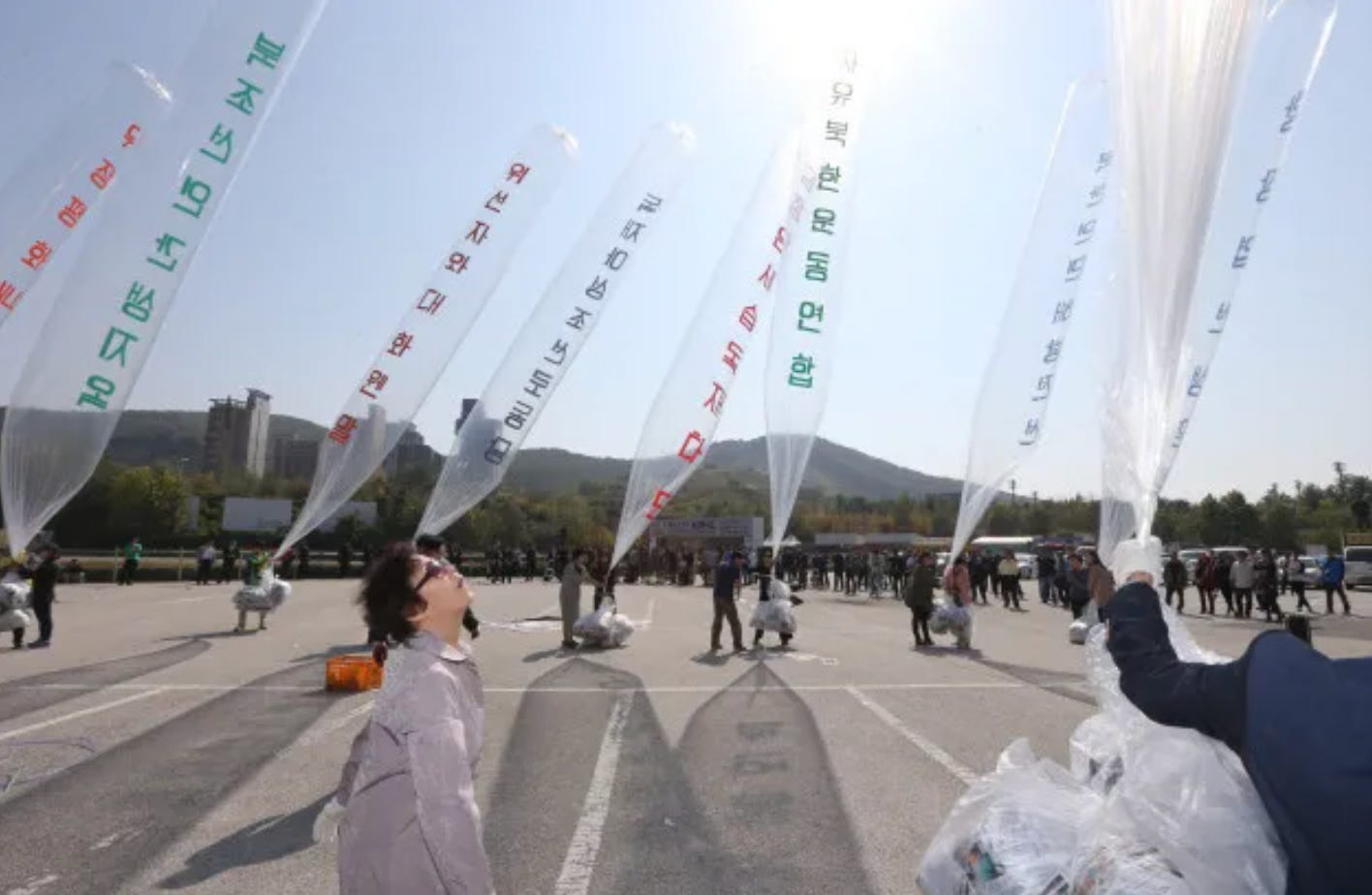
One area where President Lee and his prime minister may clash with the US critics is his handling of North Korean defector groups who try to subvert South Korea's engagement policies by sending anti-DPRK propaganda across the border at the DMZ.
Last week, Lee ordered South Korean officials to "devise specific ways to block the cross-border launch of propaganda leaflets, which elevate military tensions on the Korean Peninsula and threaten the everyday routines and personal safety of people on the border." He also "repeated his threat to sternly punish the launch of propaganda balloons during a meeting with border residents," Hankyoreh, Seoul's progressive daily, reported.
The Kyunghyang Shinmun explained the significance of the move.
Tensions had sharply escalated in June of last year when the Yoon government resumed psychological warfare broadcasts in retaliation for North Korea’s release of balloons carrying trash across the border. In turn, North Korea began blaring its own noise broadcasts toward the South. In truth, the initial provocation, the balloon launches, stemmed from South Korean private groups sending anti-North leaflets across the border. As both sides engaged in tit-for-tat exchanges, residents in the border region suffered from insomnia, anxiety, and other stress-related conditions. The collapse of tourism further devastated the local economy. The Lee administration must now act decisively to prevent any recurrence of this disruption to civilians’ daily lives.
I added the emphasis above because many of the "private" defector groups responsible for the balloon campaigns are funded by US neocons posing as "human rights" activists. As I reported in 2020 for the Korean investigative site Newstapa, the US organizations behind the "Fighters for North Korea" and other defector organizations launching the balloons "are the most recent example of the American habit of trying to curb South Korea’s sovereign right to conduct its own foreign policy - particularly its delicate peace diplomacy with North Korea."
The key US backers of the anti-DPRK organizations are two Washington-based organizations, the North Korea Freedom Coalition, a Washington organization run by the far-right Virginia political activist Suzanne Scholte, and the Human Rights Foundation, founded by the loony Venezuelan right-winger Thor Halverrson. Scholte's group, in turn, is a project of the Defense Forum Foundation, an extremist, pro-intervention organization funded by military contractors and defense-focused private equity funds. Until recently, the high-profile defector campaigns were also funded by the US government's notorious National Endowment for Democracy until - to the horror of Washington's neocons - its funds were frozen by Elon Musk's Department of Government Efficiency (DOGE) under Trump 2.0. As I reported five years ago:
The North Korea Freedom Coalition and the Human Rights Foundation are, with the US government’s National Endowment for Democracy, the largest foreign donors to the defector groups. All of these groups are linked to the “Committee for Human Rights in North Korea” (HRNK), the most powerful of the pro-defector groups in Washington, where NKFC chairman Scholte and Carl Gershman, the founder and former president of NED, sit on the board of directors...Halvorssen is already well-known in South Korea and among US Korea analysts for his belligerent demonstrations with defectors during previous governments in Seoul. During the administration of Park Geun-hye, he garnered extensive media coverage for his “Hack Them Back” campaign against inter-Korean peace talks...
Another close ally in the US media is Gordon G. Chang, a right-wing commentator who is often featured on Fox News and MSNBC, two of America’s largest broadcasters. “President Moon Jae-in [who also put a stop to the balloon antics] is doing his best to end democracy in South Korea,” Chang fervently declared in a 2016 speech to Scholte’s group. “More importantly, [Moon] is working to end South Korea itself.”

Chang, who I call "Fash Gordon" on Twitter/X, has resumed his campaign with Lee in the presidency and is attacking him in social media with the same strident and false accusations he deployed against Moon. If I know this information, you can bet that South Korea's National Intelligence Service (NIS) does as well. For that reason, Lee's move to stop the cross-border campaigns should be seen as not only a way to curb the power of the South Korean far-right, but as a weapon against covert US intervention in South Korea. He is defending South Korea's sovereignty - much to the dismay of Trump's MAGA supporters.
"It’s tragic that a left-wing party beholden to the Chinese Communist Party has taken power in such a key partner country [as South Korea], MAGA leader Steve Bannon told the right-wing Chosun Ilbo in an interview that ran on its front page. “We will not stay silent.”
Bannon dismissed Lee's "pragmatic diplomacy" as "naive and dangerous" and "full of shit." He insinuated, like Chang and his fascist allies do, that Lee is a tool of Beijing. “This is classic CCP political warfare. If South Korea believes in freedom and democracy, it cannot claim neutrality between the U.S. and China. You can’t balance between liberty and slavery.”
But it's unlikely that the MAGA message will get far in today's South Korea. During last week's anti-ICE protests in Los Angeles, Donald Trump Jr., the drug-addled son of the president, post a message to his 15 million followers on Twitter/X about the Korean role in the 1992 riots in LA. "Make Rooftop Koreans Great Again!" he exclaimed above a famous photo showing a Korean shopkeeper on a rooftop carrying a rifle to protect Korean-owned shops during the 1992 unrest. This infuriated South Koreans as well as many Korean Americans in the United States.
Writing in Hankyoreh, commentator Seo Bokyeung denounced the MAGA influencer. "The younger Trump’s message was horrific and brutal in the way it starkly revealed the intention of furthering the president’s own political interests by encouraging fighting among minorities in US society." She noted that the first LA riots "erupted as a form of resistance against deep-rooted racism within the US government and society [and] also had a tragic outcome in terms of clashes between the Black and Korean American communities."
Bokyeung also compared Trump's militaristic response to Los Angeles - where he called in the National Guard and the US Marines over the objections of California's governor and lawmakers - to Yoon's martial law grab last December. "While there is no way of knowing where the current situation in the US will lead, the events so far bring up memories of what the South Korean people went through during the Yoon Suk-yeol presidency," she concluded.
For more on the US-based regime change forces seeking to undermine South Korea's attempts at reconciliation with the DPRK, see my Patreon article, "Beyond Utopia: Another False Narrative About Korea."



